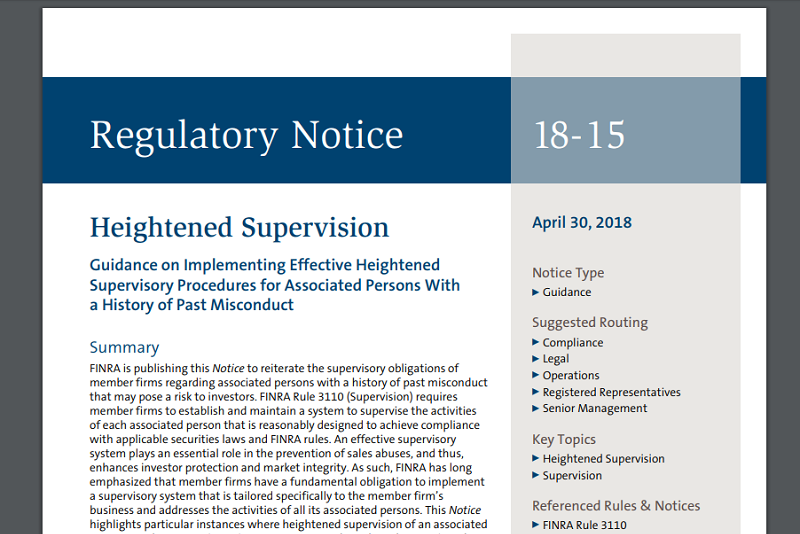BROWSE BY TOPIC
- Bad Brokers
- Compliance Concepts
- Investor Protection
- Investments - Unsuitable
- Investments - Strategies
- Investments - Private
- Features/Scandals
- Companies
- Technology/Internet
- Rules & Regulations
- Crimes
- Investments
- Bad Advisors
- Boiler Rooms
- Hirings/Transitions
- Terminations/Cost Cutting
- Regulators
- Wall Street News
- General News
- Donald Trump & Co.
- Lawsuits/Arbitrations
- Regulatory Sanctions
- Big Banks
- People
TRENDING TAGS
Stories of Interest
- Sarah ten Siethoff is New Associate Director of SEC Investment Management Rulemaking Office
- Catherine Keating Appointed CEO of BNY Mellon Wealth Management
- Credit Suisse to Pay $47Mn to Resolve DOJ Asia Probe
- SEC Chair Clayton Goes 'Hat in Hand' Before Congress on 2019 Budget Request
- SEC's Opening Remarks to the Elder Justice Coordinating Council
- Massachusetts Jury Convicts CA Attorney of Securities Fraud
- Deutsche Bank Says 3 Senior Investment Bankers to Leave Firm
- World’s Biggest Hedge Fund Reportedly ‘Bearish On Financial Assets’
- SEC Fines Constant Contact, Popular Email Marketer, for Overstating Subscriber Numbers
- SocGen Agrees to Pay $1.3 Billion to End Libya, Libor Probes
- Cryptocurrency Exchange Bitfinex Briefly Halts Trading After Cyber Attack
- SEC Names Valerie Szczepanik Senior Advisor for Digital Assets and Innovation
- SEC Modernizes Delivery of Fund Reports, Seeks Public Feedback on Improving Fund Disclosure
- NYSE Says SEC Plan to Limit Exchange Rebates Would Hurt Investors
- Deutsche Bank faces another challenge with Fed stress test
- Former JPMorgan Broker Files racial discrimination suit against company
- $3.3Mn Winning Bid for Lunch with Warren Buffett
- Julie Erhardt is SEC's New Acting Chief Risk Officer
- Chyhe Becker is SEC's New Acting Chief Economist, Acting Director of Economic and Risk Analysis Division
- Getting a Handle on Virtual Currencies - FINRA
ABOUT FINANCIALISH
We seek to provide information, insights and direction that may enable the Financial Community to effectively and efficiently operate in a regulatory risk-free environment by curating content from all over the web.
Stay Informed with the latest fanancialish news.
SUBSCRIBE FOR
NEWSLETTERS & ALERTS
FINRA Offers New Guidance on Heightened Supervision
by Howard Haykin
FINRA reminds firms to routinely evaluate their supervisory procedures to ensure they are appropriately tailored for each associated person and take into consideration, among other things, the person’s activities and history of industry and regulatory-related incidents. When an associated person of the firm has a history of industry or regulatory-related incidents, the firm must make a reasonable determination as to whether its standard supervisory and educational programs are adequate to address the issues such person’s history raises or whether the firm should develop tailored heightened supervisory procedures to address such issues.
IDENTIFYING INDIVIDUALS FOR HEIGHTENED SUPERVISION. When considering heightened supervision for individuals, firms should take into account, among other things: (i) customer-related regulatory actions; (ii) criminal matters; (iii) the firm’s pre-registration investigation; (iv) internal investigations; (v) firm-imposed discipline; (vi) disciplinary actions; (vii) final, pending and settled arbitrations; (viii) past, open or settled customer complaints; (ix) terminations for cause; and, (x) other items disclosed on the person’s uniform registration forms.
While final adverse adjudicated matters such as disciplinary actions, criminal matters and arbitrations clearly indicate a disciplinary problem, a pattern of unadjudicated matters, such as unadjudicated customer complaints, also may be indicative of a history that should be carefully reviewed.
Heightened supervision should also be considered when an associated person is statutorily disqualified (SD) yet wants to continue associating with a member firm. In such instances, the individual is permitted to remain associated with the member firm so long as the firm promptly files a Form MC-400 application (SD Application) and it adopts a heightened supervisory plan that will be implemented while FINRA reviews the application. Heightened supervision would also be appropriate for persons whose disciplinary cases are pending appeal to the National Adjudicatory Council (NAC).
DEVELOPING AND IMPLEMENTING A HEIGHTENED SUPERVISION PLAN. Once a firm determines that heightened supervision is necessary, the firm should develop written, tailored heightened supervisory procedures that address the nature of the particular concerns the associated person’s incident history raises and the nature of such person’s ongoing activities. At a minimum, an effective heightened supervision plan should include:
- designating a principal with the appropriate training and experience to implement and enforce the plan;
- requiring appropriate additional training for the associated person subject to the plan to address the nature of incidents resulting in the plan;
- requiring the written acknowledgment of the heightened supervisory plan by the associated person subject to the plan and the designated supervisory principal; and,
- periodically reviewing the heightened supervision plan to assess its effectiveness.
Beyond these minimum provisions, FINRA recommends that heightened supervision plans provide for:
- heightened supervision of the associated person’s business activities, including customer-related activities, employee personal trading accounts, outside business activities and private securities transactions;
- proximity of the supervisor to the associated person;
- more frequent contact between the supervisor and the associated person;
- more frequent review of the associated person’s communications, particularly with customers;
- more frequent monitoring or inspection of the associated person’s office(s); and,
- expediting the handling of customer complaints related to the associated person.
[Click link for FINRA’s complete discussion of Heightened Supervision.]





